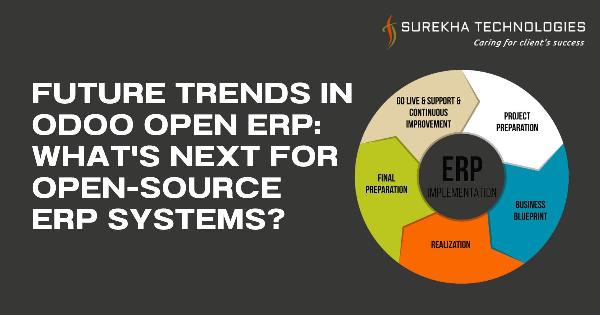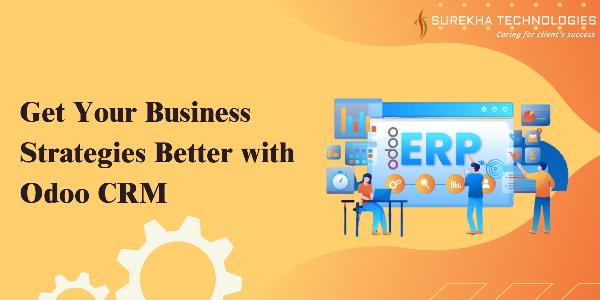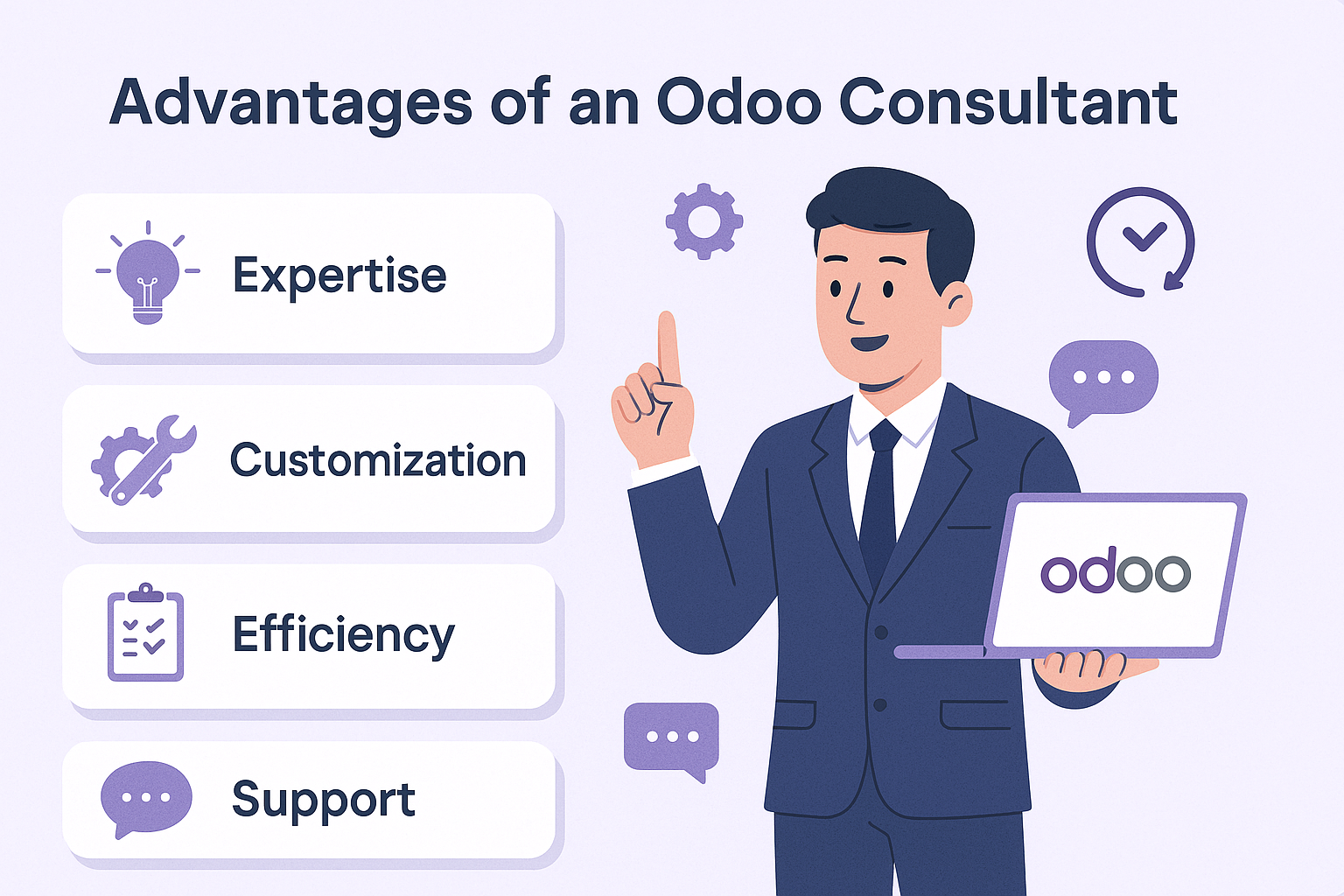Future Trends in Odoo Open ERP: What's Next for Open-Source ERP Systems?

Strong 8k brings an ultra-HD IPTV experience to your living room and your pocket.
Open-source ERP systems have been transforming the business landscape, and Odoo Open ERP stands at the forefront of this revolution. As a flexible, cost-effective, and scalable solution, Odoo is continuously evolving to meet the dynamic needs of businesses. Here, we explore the future trends in Odoo Open ERP and what’s next for open-source ERP systems.
1. Increased Adoption of AI and Machine Learning
One of the most significant trends in the ERP space is the integration of Artificial Intelligence (AI) and Machine Learning (ML). Odoo is expected to leverage these technologies to enhance its functionality, providing businesses with predictive analytics, automated processes, and personalized user experiences. AI can help in demand forecasting, inventory management, and customer service, while ML algorithms can identify patterns and insights from large data sets, enabling smarter decision-making.
2. Enhanced User Experience
The future of Odoo Open ERP will see a heightened focus on user experience (UX). With businesses seeking more intuitive and user-friendly interfaces, Odoo will continue to improve its UX design. This includes simplifying complex processes, enhancing navigation, and offering more customizable dashboards. The aim is to make the system more accessible to non-technical users, ensuring that businesses of all sizes can effectively utilize its capabilities.
3. Integration with IoT
The Internet of Things (IoT) is becoming increasingly relevant in various industries, and its integration with ERP systems like Odoo will be a game-changer. IoT devices can provide real-time data to the ERP system, enhancing operational efficiency and decision-making. For example, in manufacturing, IoT sensors can monitor equipment performance and send data to Odoo for predictive maintenance. This integration will help businesses streamline operations, reduce downtime, and improve productivity.
4. Cloud-Based Solutions
The shift towards cloud-based ERP solutions is already underway and will continue to grow. Cloud-based Odoo solutions offer numerous benefits, including lower upfront costs, scalability, and accessibility from any location. This trend is particularly significant for small and medium-sized enterprises (SMEs) that require flexible and cost-effective ERP solutions. As a result, more businesses will opt for cloud-based Odoo, driving innovation and growth in the ERP market.
5. Mobile ERP
With the increasing reliance on mobile devices, mobile ERP solutions are becoming essential. Odoo is expected to enhance its mobile capabilities, allowing users to access and manage their ERP system from smartphones and tablets. This mobility ensures that employees can perform critical tasks on the go, improving responsiveness and productivity. Mobile ERP will also facilitate remote work, which has become a standard practice in many industries.
6. Advanced Data Analytics
Data is the backbone of modern business operations, and advanced data analytics will play a crucial role in the future of Odoo Open ERP. Businesses will seek more powerful analytics tools to gain insights into their operations, customer behavior, and market trends. Odoo will continue to develop its analytics capabilities, offering advanced reporting, data visualization, and real-time dashboards. This will enable businesses to make data-driven decisions, optimize processes, and stay competitive.
7. Blockchain Integration
Blockchain technology is gaining traction in various sectors, and its integration with ERP systems is a trend to watch. For Odoo, blockchain can provide enhanced security, transparency, and traceability in transactions. This is particularly beneficial for industries like supply chain, finance, and healthcare, where data integrity and security are paramount. Blockchain can ensure that data is tamper-proof and verifiable, adding a layer of trust to business operations.
8. Increased Focus on Customization
Customization has always been a strength of Odoo, and this trend will continue to grow. Businesses have unique needs and processes, and a one-size-fits-all approach doesn’t work. Odoo’s modular architecture allows for extensive customization, enabling businesses to tailor the ERP system to their specific requirements. The future will see even more customization options, making Odoo an even more versatile and adaptable solution.
9. Expanding Odoo Development Services in the USA
The demand for Odoo development services in the USA is on the rise, driven by the need for robust and scalable ERP solutions. As more businesses in the USA recognize the benefits of Odoo, the demand for skilled Odoo developers will increase. Odoo development companies will expand their services, offering comprehensive solutions that include implementation, customization, and support. This trend will contribute to the growth of Odoo’s market share in the USA.
10. Collaboration and Social ERP
The future of Odoo will also see a focus on collaboration and social ERP. Businesses are increasingly looking for ways to enhance communication and collaboration among employees. Odoo will integrate social features, such as internal messaging, project management tools, and collaborative workspaces, to facilitate teamwork. These features will help businesses streamline communication, improve project management, and foster a collaborative work environment.
11. Emphasis on Cybersecurity
As ERP systems handle sensitive business data, cybersecurity will remain a top priority. Odoo will continue to enhance its security features to protect against cyber threats. This includes implementing advanced encryption, multi-factor authentication, and regular security updates. Businesses can expect more robust security measures to ensure that their data is safe and secure.
12. Sustainability and Green ERP
Sustainability is becoming a critical focus for businesses globally. Odoo will likely incorporate features that help businesses manage and track their sustainability initiatives. This includes tools for monitoring energy consumption, waste management, and carbon footprint. By integrating sustainability into ERP systems, businesses can achieve their environmental goals while maintaining operational efficiency.
Conclusion
The future of Odoo Open ERP is bright, with numerous trends shaping its evolution. From AI and machine learning to IoT integration and cloud-based solutions, Odoo is poised to remain at the forefront of open-source ERP systems. Businesses can expect enhanced user experiences, advanced data analytics, and increased customization options. As Odoo development services in the USA expand, more businesses will leverage this powerful ERP system to drive growth and innovation. By staying ahead of these trends, Odoo will continue to provide businesses with the tools they need to thrive in a competitive market.
Note: IndiBlogHub features both user-submitted and editorial content. We do not verify third-party contributions. Read our Disclaimer and Privacy Policyfor details.







